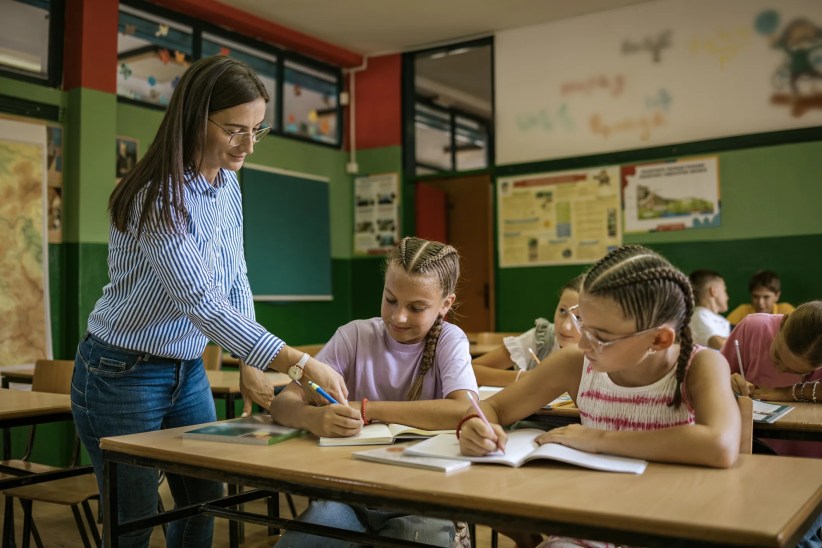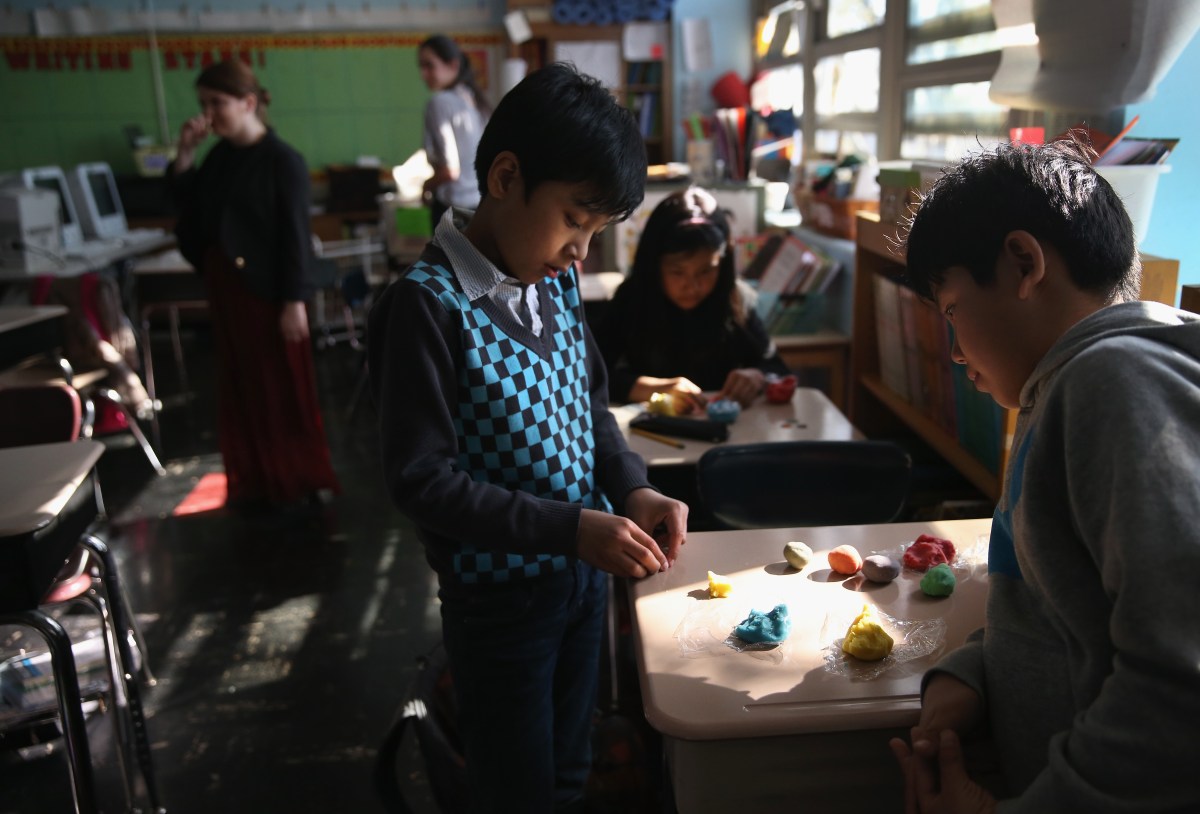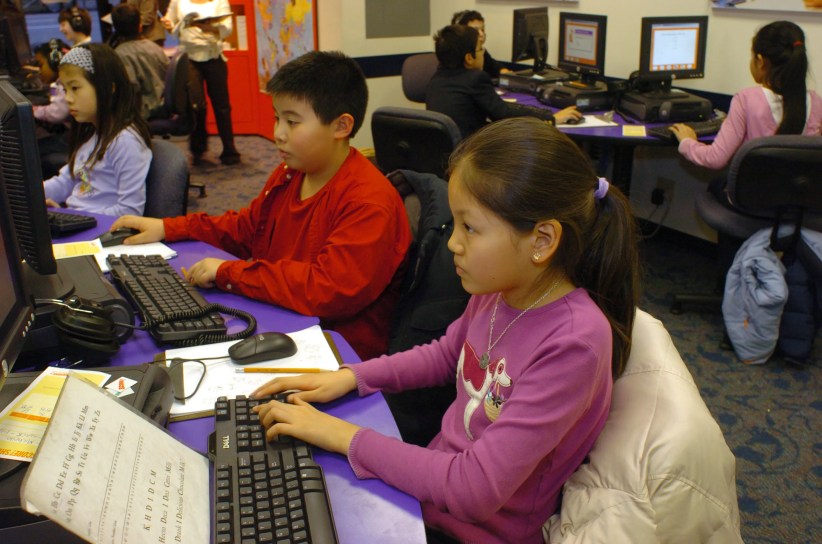With the admissions processes for many NYC and Metro-area independent schools starting in September, now is the time for parents to take a deep breath, make their lists, and check them twice. In our August issue earlier this year, we broke down the essentials of school choice; now, once you have your top schools earmarked, it’s time to focus on the application and interviews (for both parents and child) and begin building relationships with schools you’re interested in.
The process, for many independent schools, begins in September, and parents can expect to complete an online application, attend a tour and/or open house, attend a parent interview, and bring their child to an interview or group play session.
It can, indeed, be an overwhelming process, but the key is to stay organized, keep calm, and verse yourself in what to expect. Here, we caught up with local experts—savvy education consultants and admissions pros at top NYC private schools—to get the scoop on how to totally ace the admissions process!
Applying to private school in NYC for the first time? Keep these 3 expert tips in mind!
1. Start Early: “Parents will benefit from starting their research early to make sure that they can meet the admissions timelines for each school that interests them. Admissions processes often differ between schools, and parents will be able to navigate each application much more smoothly if they know what to expect. It will also take time to compile the many required documents for each application. Beginning early affords parents the opportunity to navigate the admissions process at a comfortable pace.” –Monna Istranyi, National Director of Admissions, Polis Montessori World School Manhattan
2. Set Time Aside: “Parents should expect to be available for all parts of each school’s application process. This will include a tour, parent interview, and child visit. Each visit is important and so both parents should expect to attend and engage thoughtfully. I encourage parents to use as many resources as are available—their current school director, speaking with neighbors and friends, and consulting expects.” –Kristen Pallonetti, Program Director, TriBeCa Community School
3. Ignore the Chatter: “Parents in New York City love to talk about the admissions process, so be prepared to receive a lot of (often unsolicited) advice. Friends, neighbors, colleagues, and complete strangers in the playground will tell you which schools you absolutely must apply to for your child. Since they do not first ask you to describe your child or what your priorities are in a school, gather all of these opinions as part of your research but take them with a grain of salt. At the end of the day, focus on what you are looking for and what you believe will be an ideal fit for your family.” –Erica Papir, Educational Advisor, Smart City Kids
10 Ways to Make a Great Impression at Your Interview
1. Be Open to Dialogue: “We’re here to have a conversation with parents. This is a two-way dialogue. We’re here to talk with parents, to share what we know and also to get to know them better, to learn about their child. But we’re also here to help them in making a good choice for their child.” –Martine Lala, Director of Admissions, Lycée Français de New York
2. Be On Time: “First, be on time! If you are not able to keep an appointment, be sure to let the admissions director know in advance and reschedule as soon as possible. This shows that you are thoughtful and respectful, which are qualities that all schools want for their parent communities.”–Monna Istranyi, National Director of Admissions, Polis Montessori World School Manhattan
3. Keep it Real: “We just ask that the parent(s) come to the interview ready to have a conversation about their child, their family, and their hopes for the next step in their child’s education. We are happy to use the time of the parent interview for a real conversation. It isn’t a time to ‘make a positive impression’ as much as a time to be in real relationship about their hopes and expectations about their next school community.” –Dawn Williams, Director of Admissions, Blue School
4. Do Your Research: “While admissions staff do not expect parents to do a lot of homework prior to their interview, it is important that they do some basic research (read the school’s website, and attend an open house, if available) before sitting down for their meeting. This shows admissions staff that the family is truly interested in the school and allows the interview time to be spent focused on the family, the child, and specific questions parents might have.” –Nora Thomson, Director of Preschool Admissions, Dwight School
5. Be Yourself: “If your child is involved, please be sure to let them know that he or she will be participating. Otherwise, just be yourself and make sure to think about why it is that you want to go to that particular school.” –LaNette Hodge, Director of Admissions, BASIS Independent Manhattan
[gravityform id=”18″ title=”false” description=”false” ajax=”true”]
6. Know Your Child: “Parents should take time the summer before the Kindergarten application season to brainstorm and gather anecdotes about their child. One helpful exercise is for parents to think of ways to identify their child without using physical characteristics. How would the admissions director be able to spot their child in a playground without knowing any physical characteristics? What makes their child and family unique? What is most important to their family about their child’s education? It is also helpful to think of three adjectives that describe their child and anecdotes that help illustrate those adjectives. Going through this process is quite rewarding for parents as it forces them to sit down and really think about their child.” –Jessica Anub, Candace La Douceur & Liz Lowy, Admissions Directors, Twin Parks Montessori Schools
7. Be a Team: “Parents should be on the same page in terms of what they want in a school, as well as how they will describe their child’s strengths and areas for growth. Both parents should speak during the interview, be well-versed in the school’s program, and have appropriate questions prepared.” –Kristen Pallonetti, Program Director, TriBeCa Community School
8. Ask Questions: “Do your research, but come prepared to ask questions too. We see the parent interview as a two-way street. I really like when parents ask about our teachers. It shows they are honing in on perhaps the most important aspect of a school—the quality and approach of its educators. When it comes to conversations about your child, don’t feel the need to boast. Be straightforward when responding to questions and forthcoming with any information that may inform how the school can best support your child.” –Anne Belle, Head of Enrollment in New York, AltSchool
9. Articulate Why You’re Interested: “Being familiar with the school’s philosophy and curriculum is helpful; it shows that a family is thoughtful about considering that school. It is also wise to relate what qualities of that school mesh with your child and your family.” –Kate Bailey, Head of School, Wetherby-Pembridge School
10. Be Honest About Weaknesses: “It is essential for parents to be open about their child’s strengths and weaknesses in order for both sides to determine if the school is the right fit. Tell us everything, even if you think it will not be flattering. If I feel that the parents are hiding something, whether it be attendance or behavior or academic issues, I might not feel comfortable bringing them into our community, because I would not know how to best support them. However, in the past I have accepted two different families who came in and told me: ‘My child is behaving like a bully,’ because both the parent and the child were willing to talk through their issues honestly. I can work with that! If the parent and child are willing to be open with me, and commit to making a positive change, then I can feel good about giving them a fresh start.” –Hope Mueller, Principal, St. Ann-The Personal School
FAQs About Preparing Your Child For Their School Interview
What’s the best way to prepare my child for the interview?
“The best way to prepare is not to prepare at all. Don’t tell your child it’s an interview, don’t tell your child it’s important. You’ll give them the best chance by letting them just be themselves and feel as comfortable as possible.” –Doug Schachtel, Co-founder & Chief Operating Officer, Portfolio School
What can my child expect from the interview process?
“Each school will handle getting to know the child in a slightly different manner. Some schools will have a ‘playgroup’ as part of their admissions process when the child will be a part of a group of applicants visiting with teachers and/or administrators. Other formats include a ‘family visit’ when the child and parents will be together with an administrator in an office. Find out what setting your child will be walking in to in order to most accurately prepare her for the experience.” –Erica Papir, Educational Advisor, Smart City Kids
What’s the best way to explain to a young child what the interview is for?
“The main advice I would give parents is to avoid the term ‘play date.’ Instead, parents can explain to their child: ‘This is a visit to a new, fun school where you will enjoy playing a few games and activities with other visiting children.’ It takes the association away from a phrase that may be commonly associated to something else, and can help the children be prepared for what they may be asked to do at that school visit. Just switching up the words parents use can help not only that prospective family and child have the best visit possible, but also enable that school to really evaluate what may be a good fit.” –Jackie Sirgo, Director of Admissions, Speyer Legacy School
Who should take the child to their interview?
“The parent with whom your child separates most comfortably, or even the babysitter, should take your child, unless parent interviews are the same day as child visits. Tell your child a bit about what will be happening in the room (schools will be happy to share with you some details) and give them ‘permission’ to answer a teacher’s questions, complete a teacher’s activity, explore and play with items in the room, interact with other children.” –Robin Aronow, Founder, School Search NYC
How does the process differ depending on my child’s age and grade level?
“The younger children should just see the visit as a playdate and explore the new school. Older children will be assessed during their visit. They should try to be open-minded and positive and not stress about the assessment. They should try to be themselves and relax.” –Torun Kirk, Director of Admissions & Marketing, Nord Anglia International School New York
Application Do’s & Don’ts
Do:
- Minimize your child’s stress by keeping conversations about admissions out of earshot
- Check school policies about first choice letters before submitting one
- Assume that every interaction you have with a school’s faculty and staff is important
- Stay true to your family’s core values through every step of the process
- Send letters of recommendation from individuals who know your child well, especially if they have a tangible connection to the school community
Don’t:
- Feel pressured to write first choice letters—they are not required
- Write a first choice letter to more than one school
- Place more value on a school’s prestige than you do on its fit for your child
- Send a deluge of letters of recommendation and rely too much on a big name to make an impression
- Get caught up in comparing your family to other families going through the process
Words of Wisdom
“Remember that your child and your family are at the center of the process as you consider your options and the environments that might best fit your requirements, in order to minimize the stress surrounding the process itself as much as possible and secure the best outcome for your family.” –Jason Morrow, Headmaster, The British International School Of New York
“The admissions process varies from school to school, but most schools require a tour, parent interview, and a child visit. Most applications require a school report/transcript, teacher recommendations, and some require an ERB test. Schools are ultimately looking for children that will be happy and successful in their program and for families that want to be part of their community.” –Linda B. Shuffman, Director of Admissions and Enrollment Management, The Town School
“The application and admissions process offer your family the opportunity to be clear about who you are, what you value, and what you want for your child’s educational experience. Don’t be shy about communicating that to schools. We want to know about your family and child and the community that nurtures them.” –Tanya Espy-Disparti, Assistant Director of Enrollment, The Calhoun School
“As you seek to find the right fit for your family and child, it’s essential to observe the school environment firsthand and to consider its teaching approach. Has the environment been designed in a way that respects and encourages a child’s natural curiosity? How are such rhythms as phase-in and collaboration established? How is conflict resolved? What is the school’s educational philosophy and culture like?” –Ashleigh Roscishewska, Director of Admissions, The First Presbyterian Church Nursery School
Meet Our Education Experts
AltSchool, altschool.com
BASIS Independent Manhattan, manhattan.basisindependent.com
Blue School, blueschool.org
The British International School of New York, bis-ny.org
The Calhoun School, calhoun.org
Dwight School, dwight.edu
The First Presbyterian Church Nursery School, fpcns.org
Lycée Français de New York, lfny.org
Nord Anglia International School New York, nordangliaeducation.com
Polis Montessori World School Manhattan, polis.school
Portfolio School, portfolio-school.com
School Search NYC, schoolsearchnyc.com
Smart City Kids, smartcitykids.com
Speyer Legacy School, speyerlegacyschool.org
St. Ann–The Personal School, stannschoolnyc.org
The Town School, thetownschool.org
TriBeCa Community School, tribecacommunityschool.com
Twin Parks Montessori, twinparks.org
Wetherby-Pembridge, wetherby-pembridge.org























